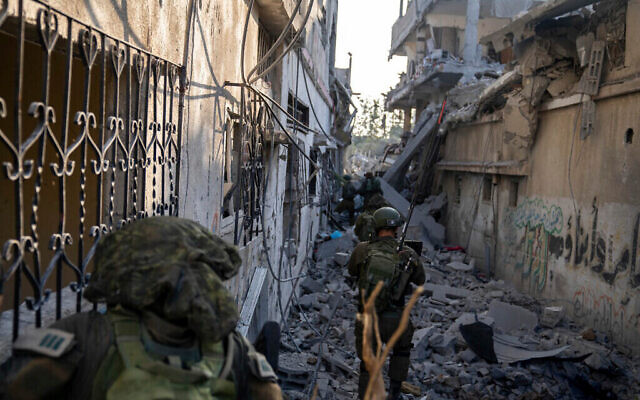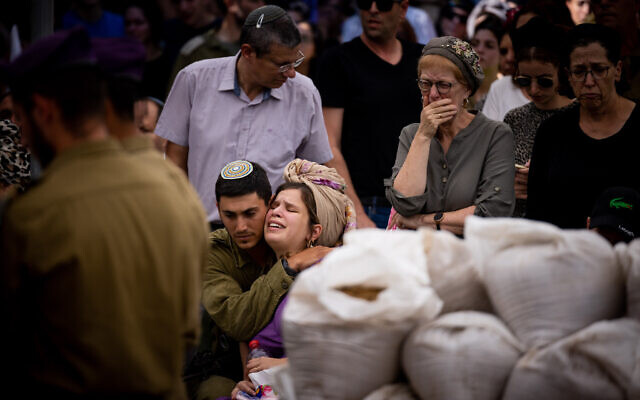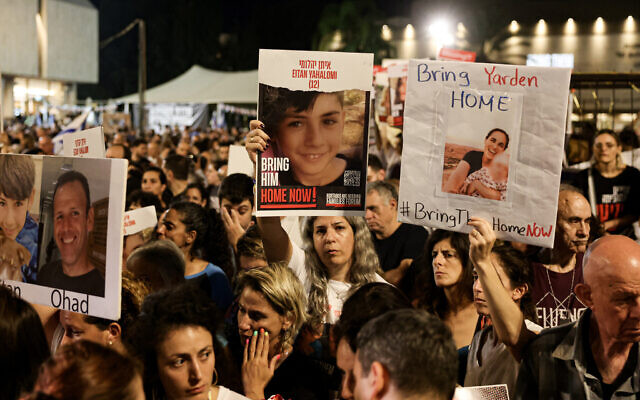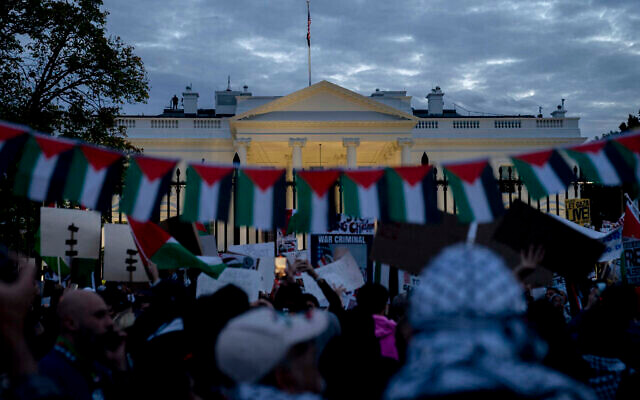Day 30 of the war: Where it began and where it will end
IDF has entered arguably the biggest military fortress ever built. The faster it operates, the more soldiers, and noncombatants, are likely to die. But how much time does it have?

(THE TIMES OF ISRAEL) Hamas’s October 7 slaughter of 1,400 people inside Israel did not happen in a vacuum, say Israel’s critics from UN Secretary-General Guterres on down, seeking to place the worst assault on Jews since the Holocaust in a context that blames Israel for the massacre of its own people and, by extension, thwart Israel’s efforts to prevent a recurrence.
Indeed, October 7 did not come out of nowhere.
It began with the War of Independence, or rather the war declared on nascent Israel aimed at preventing its independence or cutting it very short.
It continued through a series of conventional wars, relentless terrorism that reached a peak with the Second Intifada, and the ongoing campaigns that utilize lawfare to demonize Israel and attempt to destroy its legitimacy.
Israeli policies and actions regarding the Palestinians were certainly not beyond reproach through the decades, but in the intermittent efforts at peacemaking, those who spoke for the Palestinians conditioned the establishment of their independent state on terms that would spell the demise of ours. These conditions have always included the insistence on a “right of return” to today’s Israel for millions of Palestinian refugees and their descendants — a demand, that is, for an independent Palestine alongside an Israel that is to be turned into Palestine, too, by sheer weight of numbers,
The former Palestinian leader Yasser Arafat never abandoned terrorism, and fomented the Second Intifada in 2000 rather than agree to a viable two-state solution. His successor, Mahmoud Abbas, was once more moderate, but never contradicted the Arafat narrative that Jews have no history or legitimacy in the holy land, and has increasingly dismissed Zionism as a colonial project unrelated to Judaism. Having previouslyappeared to acknowledge Israel’s legitimacy in its pre-1967 lines, he now claims the right to return to live in his Safed birthplace.

Again, Israel has often harmed its own cause as regards the Palestinians, especially by promoting Jewish settlement all across the biblical Judea and Samaria, inextricably intertwining Israelis and Palestinians throughout the contested territory, depriving even the most moderate Palestinians of a vision of independence, making it easier for Palestinian extremists to recruit, and gradually reducing even the eventual possibility of a separation that would guarantee the maintenance of a Jewish and democratic Israel. That Israeli self-harm reached its apogee with the current coalition, in which Prime Minister Benjamin Netanyahu gave central roles to racist Jewish supremacists.
So, no, “this” did not begin on October 7. But — it should be beyond obvious — neither does the bitter, complex history of the Israeli-Palestinian conflict give a death-cult Palestinian-Islamist terrorist army the right to burst into this country and massacre 1,000 civilians in their beds, their homes, their communities. That bitter, complex history cannot be legitimately invoked as any kind of justification for the atrocities perpetrated by Hamas and the other barbarians who slaughtered 1,400 people and would have killed us all if they had the means. And it cannot be legitimately invoked in an effort to prevent Israel from attempting to ensure there is no recurrence.
“This right to self-defense, indeed this obligation to self-defense, belongs to every nation,” as the US Secretary of State Antony Blinken said in Tel Aviv on Friday. “No country could or should tolerate the slaughter of innocents.”
In this case, Israel has an obligation to its people to defang Hamas, whose leaders leave no doubt that they will otherwise emphatically seek to carry out slaughter after slaughter until Israel is destroyed. It has an obligation to secure the freedom of the some 240 hostages seized by Hamas and other terror groups inside Gaza. It has an obligation to ensure that other, far more powerful enemies are deterred. And it has the prime obligation to restore security for its people, hundreds of thousands of whom are currently internally displaced from south and north, unable to safely return even if they still have homes to go back to.
***
The horrifying international response to the war only underlines the imperative for Israel to prevail and ensure its survival.

October 7 is increasingly an incidental, disputed footnote, marginalized by a growing bulk of the international community, and the international leadership, that is instead misrepresenting the conflict in Gaza in a concerted effort to tie Israel’s hands. (Showing opinion shapers the unbearable footage of Hamas’s atrocities, including from its own terrorists’ bodycams, will not turn that tide, but Israel should not shrink from screening it. It is not “propaganda”; it is core to understanding the Israeli declaration of war.)
Global antisemitism is soaring — on social media, on campus, on the streets — creating fears unparalleled for decades in the Jewish Diaspora. (People in New York City, on the Upper West Side, are tearing down posters for Israelis kidnapped in Gaza?!)
Spiking hostility to Jews everywhere is often presented as pro-Palestinian protest and activism, and misreported as such. But this is activism often overtly campaigning for a Palestine “from the river to the sea” — that is, a holy land without the world’s only Jewish state. In some cases, it is activism that, far from denying Hamas’s monstrous crimes, celebrates them and seeks more. Unsurprising in Iran, depressingly predictable in Turkey, it is gaining wide support in the United States, the United Kingdom, Canada, France and the rest of the supposedly enlightened West — a horrifying phenomenon that raises profound concerns for Jewish people everywhere, regarding the capacity of the rest of humanity to treat Jews with tolerance and respect, to safeguard the Jewish people’s basic well-being.
One more reason why Israel must prevail over Hamas. Israel, the safe refuge for Jews in distress, the nation revived to ensure Jews would never again be helpless, must be able to maintain that role as guarantor for Jewish survival and security.
***
Netanyahu will have to answer for his failures in the run-up to October 7 once this is done — for the years of allowing the funds for Hamas’s war machine to flow into Gaza; for so dividing Israel this past year as to embolden the terrorists’ onslaught.
And so too will the military and intelligence chiefs, for the failure to take heed of what Hamas was saying and planning in plain sight, and instead deluding themselves into a conception of the deterred Hamas it wanted to see. One hopes that they’re not deluding themselves as regards Hezbollah leader Hassan Nasrallah’s ostensible disinclination to widen the conflict.
But while the security heads will go once the war is over, the prime minister and the far-right will not necessarily follow. Israel includes a Jewish supremacist swath of voters that wants not just, maybe not even, Netanyahu, but also Justice Minister Yariv Levin and Finance Minister Bezalel Smotrich and National Security Minister Itamar Ben Gvir, despite all the evidence of the harm they did to the fabric of our society, the distraction of resources to the West Bank, the weakening of Israel cohesion, the emboldening of Hamas and our other enemies.
One way or another, the day of reckoning for Israel and what it wants to be — and whether it can hold together — will come. For now, post-October 7 public unity is still at a relative high. Support for the IDF is near-universal. And there’s a war to win.
***
That war is far from done.
Israel has entered what is arguably the biggest military fortress ever constructed. It is probing carefully forward in northern Gaza, desperately trying to minimize casualties within our own forces, while simultaneously attempting to avoid killing the Gaza civilians that Hamas seeks cynically to keep inside the combat zone.

Anyone who anticipates a relatively short conflict is simply unrealistic. The faster the IDF moves, the higher the casualties — among Israel’s forces and Gazan noncombatants.
Critically, the IDF, as far as is known, is not sending soldiers into tunnels. “Under no circumstances” should or will it do so, the former deputy chief of staff Yair Golan said last week. “The wisdom is to find the entrances and seal them, or send in smoke that will cause the enemy to come out or will harm him,” he said. “Take my word for it: The IDF has the capabilities today to deal effectively with the tunnels. It has all the knowledge and the means. If Hamas stays in the tunnels, they will become a death trap.”
But it won’t happen quickly.
Similarly, anybody who anticipated some kind of Entebbe-style hostage rescue operation is almost certainly facing disappointment. Hamas kept Gilad Shalit, abducted from his IDF base in Israel in June 2006, hidden away in Gaza for more than five years — a single Israeli captive that Israel proved unable to locate, much less rescue. Today, there are some 240 hostages being held in Gaza — some in the hands of Hamas, others in the hands of other terror groups and clans.
This is all going to take time.
Military sources and analysts speak in terms of several months to tackle Hamas in the Gaza City area alone.
For all the ongoing IDF strikes on terror chiefs and gunmen, on tunnels and command centers, on rocket launchers and weapons stores, Hamas is estimated to have some 30,000 gunmen fighting. Some 80% of its underground tunnel network is intact, military analysts say. It is not exhibiting signs of defeat; nobody is surrendering; it is able to move its forces around; it is still firing rockets deep into Israel.

But as Hamas continues to mislead a growing proportion of the international community about what is happening on the ground, an international community that has long since moved on from the unthinkable events of October 7, and as supportive politicians feel the increasing heat of feckless public opinion, the question is how much time the military will get.
How much time can our hugely problematic, not infrequently abhorrentgovernment find the skill and wisdom to secure for the IDF? How much external pressure will the dysfunctional coalition resist? And how principled and resolute will Israel’s supporters prove, most especially US President Joe Biden and his administration?

comments